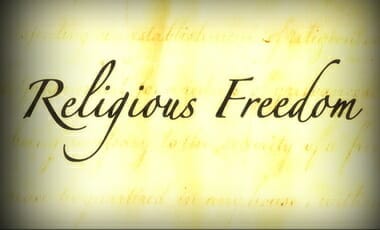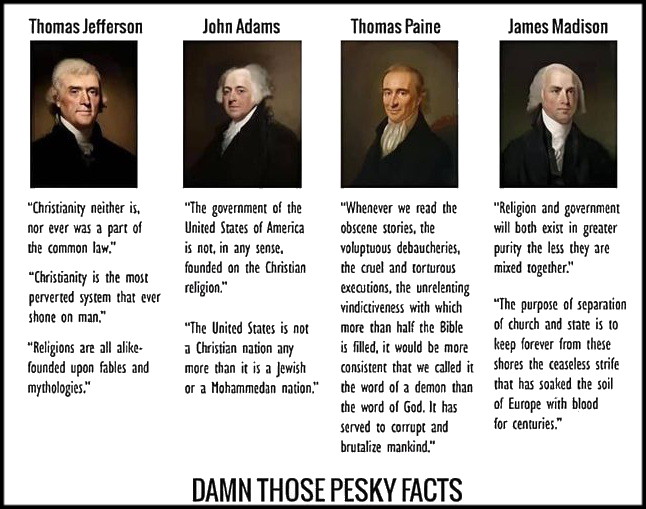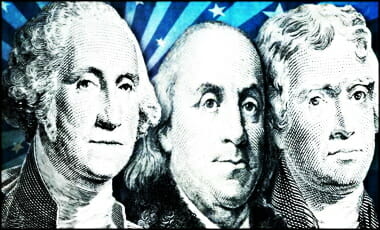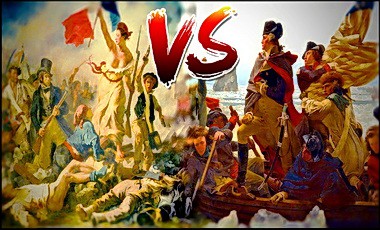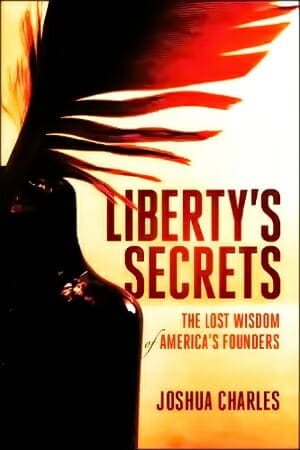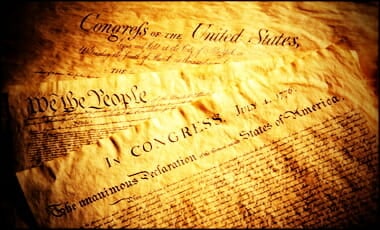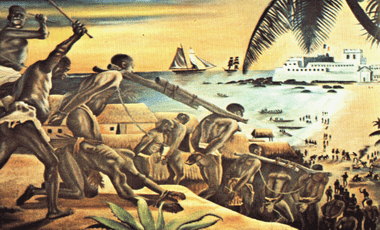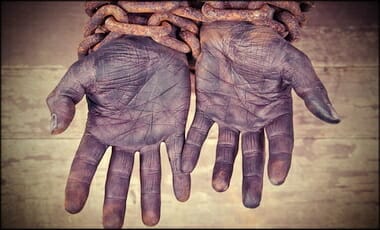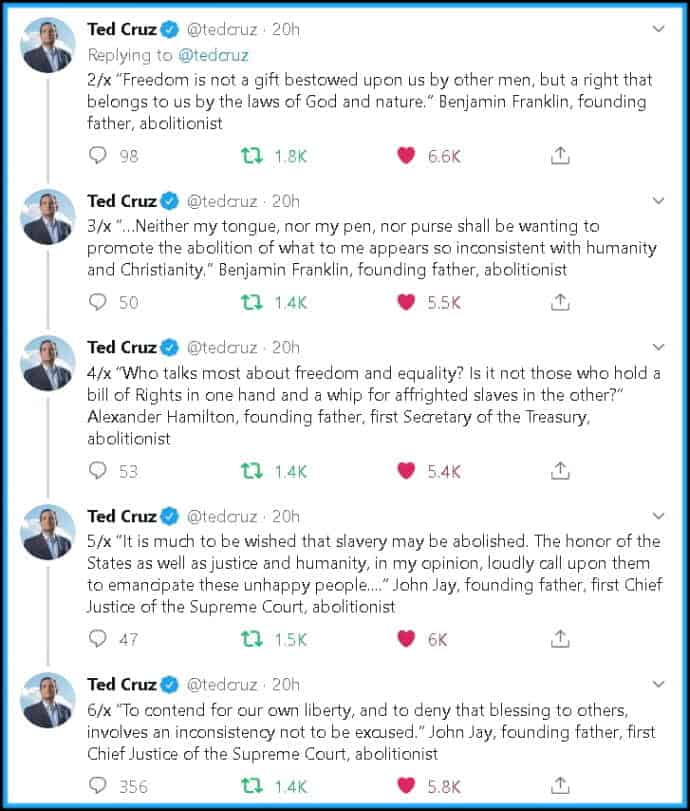INTRODUCTION TO ME
For my new readers
(This intro will make sense at the end)
Okay, this is just the beginning of a future discussion/post of a documentary; I have yet to watch it – it is called, “The 13th. I have some assumptions regarding what I know about the documentary so far due to years of that specific topic, or peripheral topics being read or discussed via talk radio. But I try to be even keeled – that being said, we all have our biases. Mine are driven by an online presence since the late 90’s “NET ZERO days” discussing religion and politics at SPACEBATTLE, then at MySpace, then a free blog at BLOGSPOT from 2006 to 2010. Then my .COM from 2010 to current time. I discuss or read the same on Twitter at times (joined 2010) as well as Facebook (joined 2008).
I have over 5,000 books and many documentaries… but do not think it is all lopsided to my view. I have many hundreds, as an example, of books by evolutionary biologists, archaeologists, anthropologists, chemists, and the like either defending, explaining evolution; likewise, many of the same refuting Intelligent Design or Creationism.
- Dawkins, K. Nielsen, D. Dennett, Sartre, Camus, Nietzsche, S. Harris, M. Martin, L. Wolpert, D. Barker, W. Provine, C. Hitchens, E. Mayr, S.J. Gould, J. Coyne, E.O. Wilson, C. Darwin, C. Zimmer, K. Miller, J. Loftus, B. Forrest and early A. Flew, etc., etc.,
I likewise have studies almost all the major world religions well. I have studied the cults as well and the occult. Topics I have read over the years include philosophy, economics, history, theology, comparative religion, cults (political and religious), apologetics, current affairs, etc.
Another quick example. Reading a commonly used quote theists used by an atheist philosopher when discussing war and religion. I wanted to see more context regarding the quote, so I purchased the book and read the entire chapter I knew the quote resided. In the end I used a slightly larger portion of the quote as it expanded the thought even further. (See the quote by Walter Sinnott-Armstrong HERE.)
- Walter Sinnott-Armstrong is an American philosopher specializing in ethics, epistemology, neuroethics, the philosophy of law, and the philosophy of cognitive science. He is the Chauncey Stillman Professor of Practical Ethics in the Department of Philosophy and the Kenan Institute for Ethics at Duke University.
In my media library I have many hundreds of debates between theists and atheists; naturalists and Intelligent Design theorists; Creationists and Evolutionists, etc. I have 2,057 uploads to my YouTube, the first one dated Apr 6, 2007. (As well as a growing RUMBLE file.) I have 57,994 Files in my Microsoft Word – the bulk of which is writing, or cataloging of debates/discussions since the late 90s I have been involved in.
Very rarely have I come across a detractor of the Christian faith who has – at some point in their life – said,
- “you know, maybe I should pick up a scholarly book or two by those that I am so passionate in my ‘matter of a fact’ statements against.”
Just one book on FAITH?
- Is God Just a Human Invention? And Seventeen Other Questions Raised by the New Atheists
- I Don’t Have Enough Faith to Be an Atheist
- Why I Am a Christian: Leading Thinkers Explain Why They Believe
Or just one book on POLITICS?
- The Vision of the Anointed: Self-Congratulation as a Basis for Social Policy
- Battle for the American Mind: Uprooting a Century of Miseducation
- The Road to Serfdom
- What’s Race Got to Do with It?: Why It’s Time to Stop the Stupidest Argument in America
Never do these people think, “I should know what I am rejecting.” Honest insight and knowledge about those whom you refute should be more common that it is. In a very old conversation I gave these examples:
I often bump into people that have watched some or most of the following “documentaries” I likewise own and have watched all on the following list (one should take note that some of these are shown in public school classrooms):
- Bowling for Columbine
- Roger and Me
- Fahrenheit 9/11
- Wal-Mart: The High Cost of Low Price
- Sicko
- An Inconvenient Truth
- Loose Change
- Zeitgeist
- Religulouse
- The God Who Wasn’t There
- Super-Size Me
But rarely do I meet someone of the opposite persuasion from me that have watched any of the following (I own and have watched):
- 11: The Temperature at Which the Brain Dies
- FahrenHYPE 9/11
- Michael & Me
- Michael Moore Hates America
- Bullshit! Fifth Season… (where they tear apart the Wal-Mart documentary)
- Indoctrinate U
- Mine Your Own Business
- Screw Loose Change
- 3-part response to Zeitgeist
- Fat-Head
- Privileged Planet
- Unlocking the Mystery of Life
People do not search out clarity, only confirmation.
….OKAY. MOVING ON….
This will be just a cataloging of some statements and discussion followed by a refutation. The discussion on Facebook started over the SCOTUS decision about the Coach praying. Here is the set up:
- The former Bremerton football coach sat down for an extended interview to discuss how he started praying on the field and what came of his decision to continue doing so.
The first challenge I wish to illuminate is one regarding “what is the coach had been a Muslim” (I respond sometimes in video as I drive for a living.)
MUSLIM
T.S. — Sean [me, RPT] so do you believe that this supreme Court would rule the same way if this coach was Muslim and brought prayer mats for all the students instead of taking a knee
RPT — that my friend is a non-sequitur
T.S. — agreed only to the point that no one could ever really know unless it happened. However, so far this court has shown more bias towards Christian beliefs, so I would speculate that they wouldn’t have ruled the same. I hope they prove me wrong in the future.
RPT — T.S. I can tell you if a Muslim went to the field, lifted his hands up and gave Allah thanks and prayed for both teams, the Court would rule the same. That is a more consistent analogy.
T.S. — So if Christians are the only ones that would walk out onto a field and pray, how is this ruling un-biased? If only Christians are those that would do something of this nature why should they be granted more rights than another religion? Or am I misinterpreting your video?
[The first of these two didn’t upload till later, but here I put it in order. in other the context is clearer for the reader vs. the flow of the original FB conversation]
[…..]
T.S. — Sean, back to your tangent, let’s say it was a Satanist that wanted to take a knee and praise the devil would that hold muster to your non-sequitur issue? Or should I be more personal and say a 3HO Sikh coach goes out and prays to Yogi Bhajan, would that be a more appropriate analogy?
I respond with a court case that makes it clear and expands upon what a religion is:
Here is a quote from the famous 1961 court case, Torcaso v. Watkins: See: Washington Ethical Society v. District of Columbia, 101 U.S.App.D.C. 371, 249 F.2d 127; Fellowship of Humanity v. County of Alameda, 153 Cal.App.2d 673, 315 P.2d 394; II Encyclopedia of the Social Sciences 293; 4 Encyclopedia Britannica (1957 ed.) 325-327; 21 id. at 797; Archer, Faiths Men Live By (2d ed. revised by Purinton), 120-138, 254-313; 1961 World Almanac 695, 712; Year Book of American Churches for 1961, at 29, 47. The Main points were made. HOWEVER, this great small commentary on the SCOTUS ruling of the coach is made by Matt Walsh MATT WALSH BOOM! See more also at RED STATE. COLIN KAEPERNICK + Discussion withing the larger issue also got started on kneeling during the anthem. Two sub-topics in this strain were about Kaepernick’s reasoning for kneeling as well as differences between actions in the “break-room” versus a prayer on the field. Private vs. Public Referencing one of the videos I did, T.S. noted this: T.S. — R.R., listen to Sean’s video as he states private company could fire somebody for talking religion and or politics so yes this teacher could have been fired because it was during school time. RPT — someone cannot be fired for praying over their lunch T.S., They can be fired for aggressive proselytizing — but SCHOOL IS A GOVERNMENT institution. Not private. RPT — So R.R., yes, listen to my video, well. Reason for Kneeling At the end of this conversation, to which I am adding to and bowing out of on Facebook per my response here, the motive for is “spite” of America, and the flag.” Nothing changes this fact. I will end with a CNN quote to make the point, after the following. (I also highlight the portion that was misstated I believe by T.S., or not known, and is the root of our disagreement): T.S. — …. How is it disrespectful to kneel for the flag but is respectful to kneel for “God”? RPT — T.S., Colin wasn’t kneeling for the flag (nor were others, they were kneeling to spite the flag) T.S. — It was in protest but not against the flag. He was taking a knee because it was brought to his attention by a Green Beret that sitting was disrespecting the flag. I agree with the Green Beret that kneeling isn’t disrespectful, and it turns out so did Colin, but somehow he’s been demonized. Those that also seem to agree that kneeling is respectful is the supreme court, as long as it fits their belief systems. RPT — honestly I don’t know where you get your ideas to support this and other claims. As usual, the facts (Kaepernicks own words) don’t fit your statement/opinion: RPT — Dom and I are headed out… but the above was Larry Elder, he does a bang-up job dealing with the issue. But knowing how people react to “conservative libertarians” [irrationally] — even going so far as calling Larry “the black face of white supremacy” — here is another source I am sure you implicitly trust: (CBS NEWS) Headed out. Love ya man. T.S. — I didn’t go back and check my source, turns out he is a Green Beret not a Marine. (NPR: “The Veteran And NFL Player Who Advised Kaepernick To Take A Knee”) Here is the non-Facebook addition to make my point and show that T.S. is off base a smidge. As a quarterback for the San Francisco 49ers, Kaepernick sparked controversy when he sat, then knelt, during the National Anthem before several 2016 NFL preseason and regular-season games. He said he did so to protest police shootings of African-American men and other social injustices faced by black people in the United States. “To me, this is something that has to change,” Kaepernick said in an August 2016 interview. “And when there’s significant change and I feel like that flag represents what it’s supposed to represent and this country is representing people the way that it’s supposed to, I’ll stand.” Kaepernick also said he could not “show pride in a flag for a country that oppresses black people and people of color.” So it is “to spite the flag,” based on lies. (More on this in a bit) That is one. Continuing, Kaepernick went from sitting to kneeling because he was disrespecting those who and are serving: After first, Kaepernick sat during the anthem. Later, he opted instead to kneel “to show more respect for men and women who fight for the country.” The change came at the suggestion of former NFL player and Green Beret Nate Boyer….. (CNN) Not to show respect for the flag. Oppressed RPT — everything Kaeper said was pretty much not true. So neither he nor the people he said police were oppressing (or the white supremacist and privileged society he espoused) have any connection to reality. So not only is he not oppressed, but neither are his “homiez” T.S. — Sean I know you’re not saying that people of color have not been and still are being oppressed, or are we just cherry picking to try and discredit one person in hopes that it discredits an entire movement. Remember until we’ve walked in someone’s shoes we can’t know their truth. RPT — T.S., how are black persons oppressed? … outside of government subsidizing fatherless homes The oppression mentioned by T.S.? Driving while black: T.S. — Sean until families of color don’t have to have the talk about driving while black there will always be a state of being subject to unjust treatment or control. Luckily you’ve never HAD to have that conversation. I’ve been on both sides of that talk and when it comes from a white person it’s about how you can get out of it without a ticket rather than with your life. RPT — T.S., …….In Ferguson, Mo., after announcing a federal investigation into the cop-shooting death of an unarmed black teen, Holder said: “I am the attorney general of the United States. But I am also a black man. I can remember being stopped on the New Jersey Turnpike on two occasions and accused of speeding. … I remember how humiliating that was and how angry I was and the impact it had on me.” The New Jersey Turnpike? The long-believed claim of “racism” on that highway has been investigated — and debunked. Twice. Numerous complaints of DWB — “Driving While Black” — were filed by blacks driving on the New Jersey Turnpike. So the state entered into a consent decree, agreed to federal monitoring and put their officers through, among other things, “sensitivity training.” New Jersey commissioned a study, checking motorists’ speed with laser guns and photographing drivers of vehicles going 15 mph or more over the speed limit. The result? It turned out that more speeders were black than white, which explained why cops pulled over black motorists so often. The U.S. Justice Department, which requested the study, did not want the results released to the public. Instead they accused the researchers of using a “flawed methodology.” Why shelve a report that disproves racism? Isn’t it good news that Jersey troopers do not pull blacks over willy-nilly? Would this not improve race relations in New Jersey? No — the facts did not fit the script. The next year, state police “stop data” showed that, on the southern part of the turnpike, 30 percent of the drivers pulled over were minority — almost twice the 16 percent rate of minority stops elsewhere on the turnpike. So amid new allegations that cops were targeting minorities, and to correct the “flawed methodology” of the previous researchers, New Jersey Attorney General Peter Harvey commissioned yet another study. The result? Again, it turned out a disproportionately higher percentage of drivers on that stretch of highway were black, and that blacks were more likely than non-blacks to drive 80 miles per hour or faster. Again, critics called the study’s methodology “flawed.”….. RPT — T.S., Some of this and more is found discussed in depth in an upload of mine 7-years ago (50 minutes long: https://youtu.be/tujTPr0SpCM). But the racial break down in New York of the police force is about 1/3rd white, 1/3rd black, and about 1/3rd Hispanic. And ticketing and stops are still heavily black. Why?? Already explained above. T.S. — So the study showed that more black people drove on that stretch of highway therefore more were pulled over. It’s like the statistic that people are more likely to get into an accident the closer to home they are. It’s a flawed study if there isn’t an equal base line all ethnicities accounted for. Now that’s just a supposition as I haven’t read their base-line, but you should get the point. I can tell you there are more white people that speed from Ventura to Santa Barbara. Does that mean the CHP aren’t biased against black people because they are pulled over less in this area (sarcastically)? I’ve personally experienced vehicles being pulled over based on the drivers color of skin. Two instances they were driving my car in areas that I drove all the time past officers. The only difference was the color of the skin of the person behind the wheel. None of this has any bearing on their treatment while being pulled over. One instance the driver was pulled out of the car pushed against the police vehicle with hands restrained while being questioned all after respectfully addressing the officer and putting the keys on the dash and hands out the window. All of this was because I had a brake light out. Did they even come talk to me the owner of the vehicle, that’s right they didn’t. He was given a warning after the officers partner heard me calling racial bias. Was I given anything, again the answer was nothing, not even a fix-it ticket or a warning. To re-iterate he was being the respectful one in this situation while I and the officers were acting inappropriately. And yet again we have found ourselves way down a rabbit hole that has no bearing on my original question. How is it disrespectful to kneel for the flag but is respectful to kneel for “God”? RPT — T.S., as well as they break the law (driving laws) more than other ethnicities: The Justice Department’s research arm, the National Institute of Justice, explains that differences in traffic stops can simply be attributed to “differences in offending.”…… (IBD) This is where the INTRO comes into play and will hopefully lead to future conversation over the aforementioned documentary. A.Y. pops in with this: A.Y. — [speaking to R.R.] the United States government is not Christian. Our country was founded on the concept of freedom of religion and separation of Church and state. Our court is not supposed to make decisions based on religious beliefs. [….] Sean, you should watch the documentary the 13th. RPT — A.Y., Can you please explain where in the Constitution it says, “separation of church and state”? I carry a copy with me and will have time to look later. I have read it for years and miss it each time. The only time that phrase is used is in a letter by Thomas Jefferson (1803?) in response to a Baptist pastor who was worried about his state setting up a Christian denomination as a “state religion.” Jefferson responded that his Baptist denomination would not have to fear because the Constitution protected religion FROM THE STATE. Not the STATE FROM RELIGION. Today people thing the latter was meant. It was not. I had a very short discussion with TED LEVINE (Silence of the Lambs, Heat, etc.) on the issue. I have noted the longer “paper” I link in the post to — above in Conversation. In fact, I have read the Federalist Papers, the Articles of Confederation (I even have a modern English version), the Declaration of Independence, and the like. Maybe you can point it out? Anyhew, off to work (late already). Got a busy day, been working 11-to-12 hours a day. Driving to Arizona on Saturday… so Monday may be my earliest to respond, well. At any rate, I always note the following to preface important conversation: “By-the-by, for those reading this I will explain what is missing in this type of discussion due to the media used. Genuflecting, care, concern, one being upset (does not entail being “mad”), etc… are all not viewable because we are missing each other’s tone, facial expressions, and the like. I afford the other person I am dialoguing with the best of intentions and read his/her comments as if we were out having a talk over a beer at a bar or meeting a friend at Starbucks. (I say this because there seems to be a phenomenon of etiquette thrown out when talking through email or Face Book, lots more public cussing and gratuitous responses.) You will see that often times I USE CAPS — which in www lingo for YELLING. I am not using it this way, I use it to merely emphasize and often times say as much: *not said in yelling tone, but merely to emphasize*. So in all my discussions I afford the best of thought to the other person as I expect he or she would to me… even if dealing with tough subjects as the above. I have had more practice at this than most, and with half-hour pizza, one hour photo and email vs. ‘snail mail,’ know that important discussions take time to meditate on, inculcate, and to process. So be prepared for a good thought provoking discussion if you so choose one with me.” RPT — If I watch the documentary, will you discuss some points of it? That is real question. You can message me in FB if you wish to be more private, or, my email is here A.Y. — sure we may discuss on here or in messenger. BRAVO. Very rarely do you find a person willing to commit to look at the facts… let us see if it holds true. …BACK TO THE DISCUSSION BETWEEN T.S. AND MYSELF… T.S. — Sean until families of color don’t have to have the talk about driving while black there will always be a state of being subject to unjust treatment or control. Luckily you’ve never HAD to have that conversation. I’ve been on both sides of that talk and when it comes from a white person it’s about how you can get out of it without a ticket rather than with your life. RPT — …….In Ferguson, Mo., after announcing a federal investigation into the cop-shooting death of an unarmed black teen, Holder said: “I am the attorney general of the United States. But I am also a black man. I can remember being stopped on the New Jersey Turnpike on two occasions and accused of speeding. … I remember how humiliating that was and how angry I was and the impact it had on me.” Numerous complaints of DWB — “Driving While Black” — were filed by blacks driving on the New Jersey Turnpike. So the state entered into a consent decree, agreed to federal monitoring and put their officers through, among other things, “sensitivity training.” New Jersey commissioned a study, checking motorists’ speed with laser guns and photographing drivers of vehicles going 15 mph or more over the speed limit. The result? It turned out that more speeders were black than white, which explained why cops pulled over black motorists so often. The U.S. Justice Department, which requested the study, did not want the results released to the public. Instead they accused the researchers of using a “flawed methodology.” Why shelve a report that disproves racism? Isn’t it good news that Jersey troopers do not pull blacks over willy-nilly? Would this not improve race relations in New Jersey? No — the facts did not fit the script. The next year, state police “stop data” showed that, on the southern part of the turnpike, 30 percent of the drivers pulled over were minority — almost twice the 16 percent rate of minority stops elsewhere on the turnpike. So amid new allegations that cops were targeting minorities, and to correct the “flawed methodology” of the previous researchers, New Jersey Attorney General Peter Harvey commissioned yet another study. The result? Again, it turned out a disproportionately higher percentage of drivers on that stretch of highway were black, and that blacks were more likely than non-blacks to drive 80 miles per hour or faster. Again, critics called the study’s methodology “flawed.”….. […] Some of this and more is found discussed in depth in an upload of mine 7-years ago (50 minutes long). But the racial break down in New York of the police force is about 1/3rd white, 1/3rd black, and about 1/3rd Hispanic. And ticketing and stops are still heavily black. Why?? Already explained above. T.S. — So the study showed that more black people drove on that stretch of highway therefore more were pulled over. It’s like the statistic that people are more likely to get into an accident the closer to home they are. It’s a flawed study if there isn’t an equal base line all ethnicities accounted for. Now that’s just a supposition as I haven’t read their base-line, but you should get the point. I can tell you there are more white people that speed from Ventura to Santa Barbara. Does that mean the CHP aren’t biased against black people because they are pulled over less in this area (sarcastically)? I’ve personally experienced vehicles being pulled over based on the drivers color of skin. Two instances they were driving my car in areas that I drove all the time past officers. The only difference was the color of the skin of the person behind the wheel. None of this has any bearing on their treatment while being pulled over. One instance the driver was pulled out of the car pushed against the police vehicle with hands restrained while being questioned all after respectfully addressing the officer and putting the keys on the dash and hands out the window. All of this was because I had a brake light out. Did they even come talk to me the owner of the vehicle, that’s right they didn’t. He was given a warning after the officers partner heard me calling racial bias. Was I given anything, again the answer was nothing, not even a fix-it ticket or a warning. To re-iterate he was being the respectful one in this situation while I and the officers were acting inappropriately. RPT — as well as they break the law (driving laws) more than other ethnicities: That is it for now, except that A.Y. did contact me with a meme… …to which I updated and older post to respond to the part that wasn’t included in the original meme, here: I have yet to see if she will acknowledge just how bad here meme was. And yes, darn those pesky facts.
The New Jersey Turnpike? The long-believed claim of “racism” on that highway has been investigated — and debunked. Twice.
